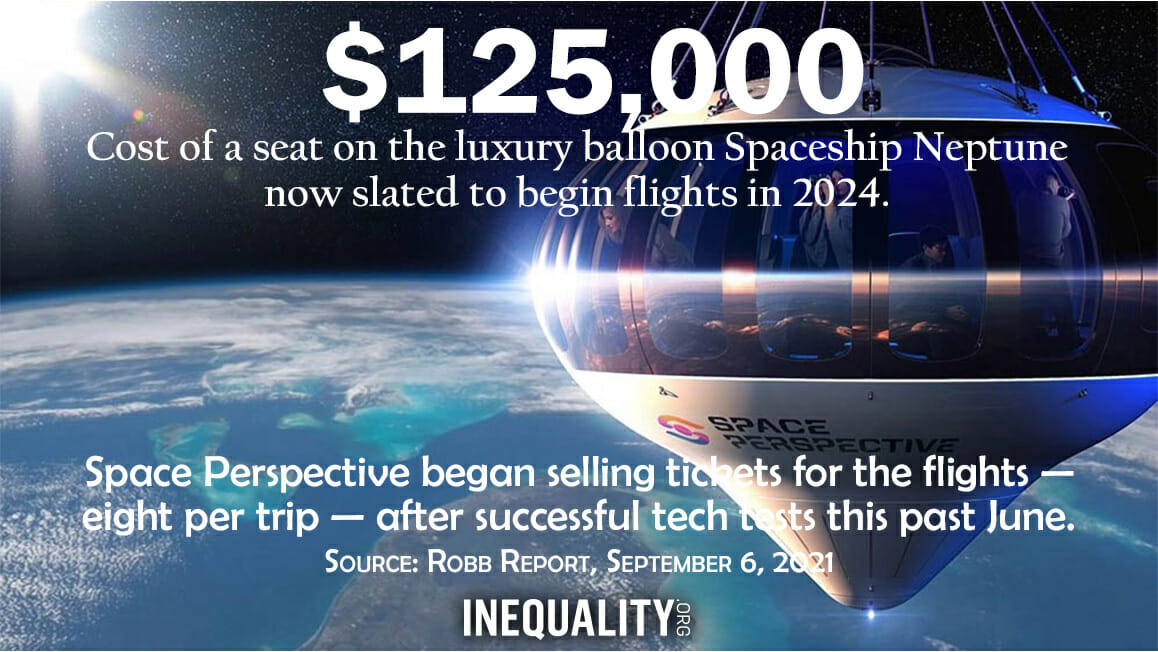| THIS WEEK |
|
For us and the other tax nerds on our team, it doesn’t get much more exciting than this. Yesterday we got our mitts on House Democrats’ proposals to pay for President Biden’s Build Back Better Plans. That leak came on top of last week’s leak of a Senate Finance Committee revenue options list.
So what do we think? As you know, we’re passionate about taxes for two reasons: the need to raise sufficient revenue to fight poverty and climate change and the need to break up the concentrated wealth that threatens our democracy. On both these counts, the House proposal moves the ball forward but doesn’t meet the scale of the moment. The House tax reforms would raise an estimated $2.2 trillion, just barely more than the revenue lost to the 2017 Republican tax cuts. Under this initial House plan, the rich would pay a higher rate on ordinary income, but billionaires like Jeff Bezos who make most of their money off investments wouldn’t owe the IRS much more.
The revenue options Senate Democrats are discussing would go further to close loopholes that benefit the ultra-rich. Senate Democrats are also considering four taxes to curb CEO pay, as Sarah Anderson details below.
In the coming weeks, let’s all keep pushing for the transformational budget deal the nation needs. And don’t forget to check Inequality.org and our social media feeds for regular updates on this rapidly evolving debate.
Chuck Collins and Rebekah Entralgo,
for the Institute for Policy Studies Inequality.org team
|
|
| |
|
| INEQUALITY BY THE NUMBERS |
 |
|
|
|
| |
|
| FACES ON THE FRONTLINES |
 |
| A Popular Educator on the History of U.S. Inequality |
| When Ericka Taylor became the popular education manager for the Take on Wall Street coalition, she expected to be traveling the country, holding workshops about the historical roots of U.S. economic inequality. Most people, she felt, already understand we have an economic system rigged in favor of the rich and Wall Street. But we need more education to expose the drivers of this rigging, particularly white supremacy and patriarchy. Then the pandemic hit and in-person workshops suddenly became no longer an option. To keep the education going, Taylor has created an amazing online interactive tool — IsOurEconomyFair.org — that walks participants through a visually compelling set of little-known facts about the historical mechanisms of inequality. Explains Taylor: “If we want to build a more equitable future, we cannot run from our history.” |
|
| |
|
| WORDS OF WISDOM |
 |
|
|
|
| |
|
PETULANT PLUTOCRAT
OF THE WEEK |
 |
| Making Millions from Four Stars on His Shoulders |
| The generals who ran America’s 20-year war in Afghanistan, the Washington Post reports, have done quite well, wallet-wise, in their post-war lives. But none of these generals have done better than Stanley McChrystal, the chief who “sought and supervised” the 2009 U.S. troop surge. McChrystal is now taking in an annual $150,000 public-service pension and thriving even more lucratively in the private sector. He’s running his own consulting company and giving speeches at $70,000 a crack. He’s also served on at least 10 corporate boards. Jet Blue handed McChrystal $1.3 million for his board time, and he’s grabbed about the same sum from Navistar, a defense contractor that appears to have defrauded taxpayers out of $1.28 billion. McChrystal is pushing back hard against any suggestion that generals like him are “just trying to get rich.” Retired generals, he argues, are just getting the “opportunities” that come to those who’ve “risen” to lofty levels. |
|
| |
|
| BOLD SOLUTIONS |
 |
| CEO Pay Taxes on the Table in the Budget Deal |
| Should overpaid CEOs be worried? The Senate’s top tax writer, Finance Committee Chair Ron Wyden, is circulating a list of revenue options to pay for President Biden’s ambitious Build Back Better plans. Four of these options seek to both generate revenue and curb CEO pay. Institute for Policy Studies executive pay expert Sarah Anderson argues that all these proposals should enjoy support across the political spectrum, given the vast majority of Americans fed up with overpaid CEOs. Among Wyden’s options: an excise tax on firms with wide gaps between CEO and worker pay. For too long, we’ve tolerated a corporate business model that funnels resources into bloated executive compensation instead of supporting working families. Widen’s options would start turning all that around. |
|
| |
|
| GREED AT A GLANCE |
 |
|
|
|
| |
|
| TOO MUCH |
 |
| Look! Up in the Sky! Another Waste of Our Talent! |
| How can we distinguish between decent civilizations and deeply corrupt ones? One telling indicator seems to hold true across wide stretches of human history: In decent societies, those with the most to offer do labor that benefits the many, not the few. In the United States today, on this ethical front, we’re not doing particularly well at all. The latest egregious example? Consider the Gulfstream G700, a new flying machine that ranks among the most impressive technical achievements of our time. Inequality.org co-editor Sam Pizzigati has more. |
|
|
|
| |
|
| MUST READS |
This week on Inequality.org
Chuck Collins and Sarah Anderson, House Tax Proposal Falls Short of Making Billionaires Pay Their Fair Share. The Ways and Means Committee plan would make a down payment on much-needed public investments but doesn't go far enough to address wealth inequality.
Bob Lord and Chuck Collins, Close Down the Estate Tax Manipulations That Benefit Billionaires. The latest tax proposals in Congress are an okay first step, but don't go far enough to address one of the biggest enablers of dynastic wealth.
Bob Lord, How One Little-Known Loophole Fuels Toxic Dynastic Wealth. Unless this generation-skipping tax exemption is strengthened, wealth dynasties will continue to grow and proliferate.
Elsewhere on the Web
Bob Lord, Does Our Tax System Benefit the Rich on Purpose? Inside Sources. The U.S. tax code’s Section 6707A may be the most compelling proof we have that our tax code intentionally tilts in favor of our wealthiest few.
Marina Hyde, Jeff Bezos is on a quest for eternal life – back on Earth, we’re searching for Amazon’s taxes, Guardian. Jeff Bezos pouring millions into a company seeking the secret to eternal life makes sense. He’s hedging against the possibility that he could come back as a Yemeni woman.
Charlie Campbell, Why 'Common Prosperity’ Has China’s Billionaires Running for Cover, Time. Beijing may soon bring in property, inheritance, and capital gains taxes to level the playing field in a society where the top 1 percent now control 31 percent of wealth, up from 21 percent two decades ago.
Matthew Klein, Inequality, Interest Rates, Aging, and the Role of Central Banks, The Overshoot. Rising inequality leads to higher indebtedness. In a highly unequal economy, the ultra rich lend everyone else the money they need to buy the goods and services sold by the businesses the ultra rich own.
Pat Garofalo, The Amazonification Of Chicago, Daily Poster. Amazon — the source of the world's largest personal fortune — has received $741 million in taxpayer subsidies in the Chicago area alone, wealth mostly extracted from local Black communities.
Jonathan Chait, The Wealth Lobby Is Buying Up Democrats to Defeat Biden’s Tax Reform, New York. A case study in how our mega rich distort democracy.
Alan Goforth and C.J. Marwitz, Shift from pensions to 401(k) plans mirrors wealth shift to top percentile, Benefits Pro. Inequality in the ownership of financial assets threatens retirement security for average Americans, a new study finds.
Josefina Salomon, Ethical Billionaires. Really? OXY. Big deep-pocket charitable donations hardly guarantee miracles. |
|
| |
|
| A FINAL FIGURE |
 |
|
|
|
| |
|
| BE THE 1% (NO, NOT THAT 1%) |
 |
Our goal for 2021: that 1% of our Inequality.org subscribers become monthly sustainers and help grow our newsletter and research efforts. Be the 1%, for as little as $3 a month! |
|
|
|
| |
|
|